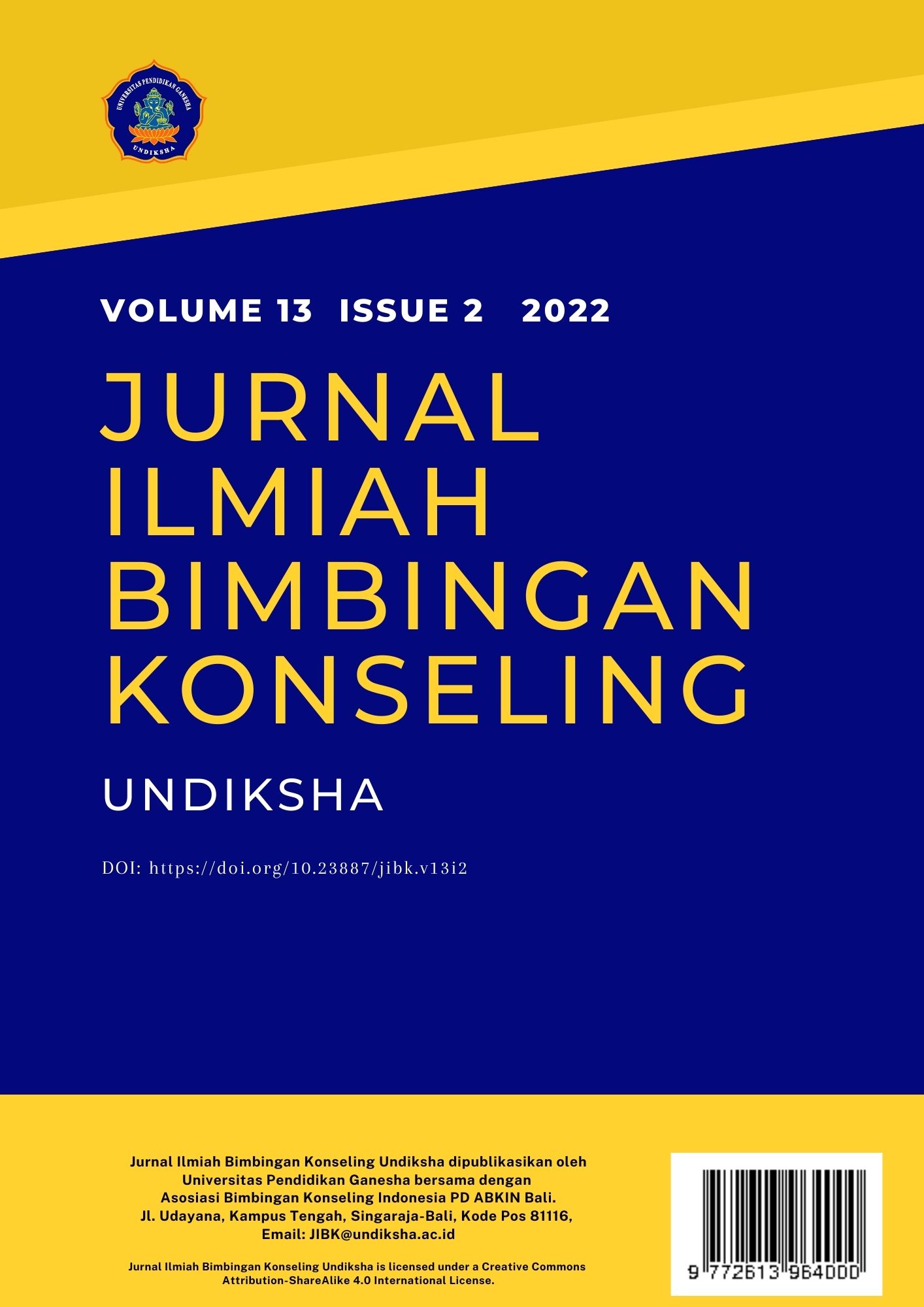Hubungan Self-efficacy dengan Hasil Belajar pada Siswa
DOI:
https://doi.org/10.23887/jibk.v13i2.35667Keywords:
Self-Efficacy, Hasil belajar, SiswaAbstract
Self-efficacy relates to activities in the process. Individuals who are involved in an activity will divide their attention and concentration when faced with other activities at the same time. Based on the narrative of the class teacher, students who have report cards above the average are students who are active, confident, enthusiastic, diligent in doing homework or teacher training. Meanwhile, students who have unsatisfactory report cards on average come from students who are quite shy, lack confidence, lack enthusiasm in learning and avoid and complain when they get assignments or homework from the teacher. The research objectives consisted of 2 types, namely general objectives and specific objectives including analyzing and describing the relationship between self-efficacy and student learning outcomes at SMP Negeri 4 Demak. The research method used is ex post facto research with quantitative research, the results of descriptive analysis of self-efficacy variables obtained in each class VII, VII and IX have the highest score of 93; the lowest score was 71; the average value is 81.24; and standard deviation of 4.33, and students who have high self-efficacy are 31 students (18.02%), students who have moderate self-efficacy are 195 students (66.86%), and the number of students who have low self-efficacy is 21 students. (15.12%). Conclusion The magnitude of the relationship or correlation between the self-efficacy variables and learning outcomes shown that there is a positive and significant relationship between the two variables.
Abstrak:
Self-efficacy berkaitan dengan aktivitas dalam proses. Individu yang terlibat dalam suatu aktivitas akan membagi perhatian dan konsentrasinya ketika dihadapkan pada aktivitas lain dalam waktu yang bersamaan. Berdasarkan penuturan wali kelas, siswa yang memiliki raport di atas rata-rata adalah siswa yang aktif, percaya diri, antusias, rajin mengerjakan pekerjaan rumah atau latihan guru. Sedangkan siswa yang memiliki raport kurang memuaskan rata-rata berasal dari siswa yang cukup pemalu, kurang percaya diri, kurang semangat dalam belajar serta menghindar dan mengeluh ketika mendapat tugas atau pekerjaan rumah dari guru. Tujuan penelitian terdiri dari 2 jenis, yaitu tujuan umum dan tujuan khusus meliputi menganalisis dan mendeskripsikan hubungan antara efikasi diri dengan hasil belajar siswa di SMP Negeri 4 Demak. Metode penelitian yang digunakan adalah penelitian ex post facto dengan penelitian kuantitatif, hasil analisis deskriptif variabel efikasi diri yang diperoleh pada masing-masing kelas VII, VII dan IX memiliki skor tertinggi yaitu 93; skor terendah adalah 71; nilai rata-rata adalah 81,24; dan standar deviasi sebesar 4,33, dan siswa yang memiliki efikasi diri tinggi sebanyak 31 siswa (18,02%), siswa yang memiliki efikasi diri sedang sebanyak 195 siswa (66,86%), dan jumlah siswa yang memiliki efikasi diri rendah sebanyak 21 siswa. siswa. (15,12%). Kesimpulan Besarnya hubungan atau korelasi antara variabel efikasi diri dengan hasil belajar menunjukkan bahwa terdapat hubungan yang positif dan signifikan antara kedua variabel tersebut.
References
Alwisol. (2004). Psikologi Kepribadian. Malang : UMM Press.
Bandura, Albert. (1997). Self Efficacy : The Exercise Of Control. New York : W.H. Freeman and Company.
Bandura, A. 2005. Self-Efficacy The Exercise of Control. New York: W. H. Freemanand Company. (Online) dalam (http://skripsipsikologie.wordpress.com/2010/07/05/efikasi-diri-dan- kecemasan/ di akses pada 28 Februari 2020).
Bandura, A. & Edwin. A. 2006. Negative Self-Efficacy and Goal Effects Revisited. Journal of Applied Psychology. (Online). Vol. 88, No.1, 87-99 dalam (http://www.emory.edu/education/. di akses pada 28/02/2020). DOI: https://doi.org/10.1037/0021-9010.88.1.87
Bundu. Patta. (2006). Penilaian Keterampilan Proses dan Sikap Ilmiah dalam Pembelajaran Sains SD . Jakarta: Depdiknas
Bloom (dalam Sudjana). 2014. Penilaian Hasil Belajar. Bandung: Tarsito Bandung
Dwi Siswoyo, dkk. (2007). Ilmu Pendidikan. Yogyakarta : UNY Press
Farah Maulida, dkk. 2018. Hubungan Self Efficacy dengan Hasil Belajar Matematika Siswa di MAN 7 Jakarta. Univeristas Muhammadiyah Prof Hamka: Jakarta Selatan (Vol 1, 2018)
Fatiya Rosyida, dkk. 2016. Pengaruh Kebiasaaan Belajar dan Self Efficacy Terhadap Hasil Belajar Geografi di SMA. DOI: https://doi.org/10.17977/um017v21i22016p017
Gusriko Hardianto, Erlamsyah & Nurfarhanah 2014 Hubungan Antara Self-efficacy Akademik Dengan Hasil Belajar Siswa jurnal konselor Volume 3 Number 1 DOI: https://doi.org/10.24036/02014312978-0-00
Gloria A Tangkeallo, dkk.2014. Hubungan Antara Self Efficacy Dengan Orientasi Masa Depan Mahasiswa Tingkat Akhir. Pekanbaru: UIN Sultan Syarif (vol, 1 No. 10, 2014)
Hermoni. 201. Karakter Belajar Siswa. Bandung:Alfabeta
Nana Syaodih Sukmadinata. (2006). Metode Penelitian Pendidikan. Bandung: PT Remaja Rosda Karya.
Ormrod, Jeanne Ellis. (2008). Psikologi Pendidikan : Membantu Siswa Tumbuh dan Berkembang. Jakarta : Erlangga.
Purwanto.2014. Evaluasi Pembelajaran. Yogyakarta:Pustaka Pelajar
Downloads
Published
Issue
Section
License
Copyright (c) 2022 Anang Aulia Rizki, Sugiyo

This work is licensed under a Creative Commons Attribution 4.0 International License.
Jurnal Ilmiah Bimbingan Konseling Undiksha is an Open Access Journal. The authors who publish the manuscript in this journal agree to the following terms:
JIBK is licensed under a Creative Commons Attribution 4.0 International License. This permits anyone to copy, redistribute, remix, transmit and adapt the work provided the original work and source is appropriately cited.
This means:
Jurnal Ilmiah Bimbingan Konseling is licensed under a Creative Commons Attribution 4.0 International License.
(1) Under the CC-BY license, authors retain ownership of the copyright for their article, but authors grant others permission to use the content of publications in JIBK in whole or in part provided that the original work is properly cited. Users (redistributors) of JIBK are required to cite the original source, including the author's names, JIBK as the initial source of publication, year of publication, volume number, issue, and Digital Object Identifier (DOI); (2) The authors are the copyright owner of the article, and the author grants the JIBK held the first publication right.









.png)

.jpg)
